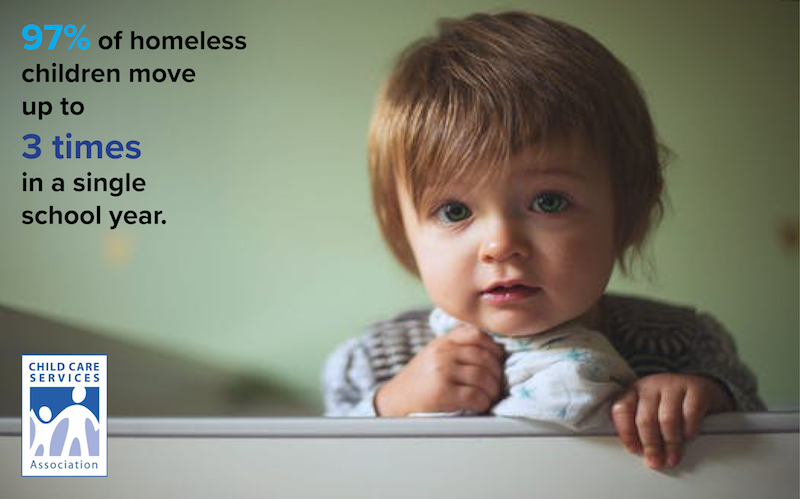Homelessness is a reality for many families with young children in our country. In fact, infancy is the period of life when a person is at highest risk of living in a homeless shelter in the U.S. And families with younger parents are at higher risk of experiencing sheltered homelessness than families with relatively older parents. Adults between the ages of 18 and 30 in families with children were three times more likely to use shelter programs than adults over 30 who live with children (U.S. Department of Housing and Urban Development, 2016 AHAR Part 2).
As president of Child Care Services Association (CCSA), I am committed to ensuring that all our young children have high quality early care and education experiences. CCSA works to ensure affordable, accessible, high quality child care for all families through research, services and advocacy. We provide free referral services to families seeking child care, financial assistance to families who cannot afford quality child care, technical assistance to child care businesses, and educational scholarships and salary supplements to child care professionals through the T.E.A.C.H. Early Childhood® and Child Care WAGE$® Projects.
More and more people understand that high quality early childhood care and learning prepares children to succeed in the classroom and in life. Yet, what may not be known is that the impact of homelessness on children, especially young children, is extremely challenging and may lead to changes in brain architecture that can interfere with learning, social-emotional development, self-regulation and cognitive skills. In today’s world, children should be healthy, alert and motivated to have a better chance of leading productive lives. Not every child, however, has that chance.
Last week, Chapin Hall released Missed Opportunities: Pregnant and Parenting Youth Experiencing Homelessness in America. This third Research-to-Impact brief by Chapin Hall presents findings related to the experiences of young people who are pregnant or parenting and don’t have a stable place to live. They learned that rates of pregnancy and parenthood are high among youth experiencing homelessness, and that many of the young parents are homeless with their children. For pregnant and parenting youth who are homeless, the difficulties of coping with pregnancy and parenthood are compounded by the trauma they have experienced and the ongoing stress of not having a safe or stable place to live with their children.
We know that experiences of homelessness in early childhood are associated with poor early development and educational well-being. These experiences during infancy and toddlerhood are associated with poor academic achievement and engagement in elementary school (Perlman & Fantuzzo, 2010). Additionally, experiences of homelessness are associated with social emotional delays among young children (Haskett, et. al, 2015) and poor classroom-based social skills in elementary school (Brumley, Fantuzzo, Perlman, & Zager, 2015). These findings underscore the importance of ensuring that young children and their young parents who are experiencing homelessness have access to support that is critical to improving the long-term educational outcomes of children nationwide.
Karen McKnight, director of our NC Head Start Collaboration Office, coordinated a statewide Trauma in Early Childhood Education Workgroup, and I feel fortunate to be part of this effort. Promoting early childhood development and buffering stress experienced by young children experiencing homelessness and their families will be part of this work. This group of professionals from Head Start, Smart Start, CCR&R, PCANC, NCAEYC, NCIMHA and others will be attending a two-day on-campus program, facilitated by Nonie Lesaux and Stephanie Jones, faculty directors of the Saul Zaentz Early Education Initiative at the Harvard Graduate School of Education. The training is guided by the question: How can early education leaders support the design and implementation of strong early learning environments, particularly in settings serving children facing adversity?
I hope we can all work together to have an early childhood workforce to meet the social-emotional and mental health needs of all our young children and their families. May is Mental Health Awareness Month. How are you supporting this work?
See additional resources below.
- Self-Assessment Tool for Early Childhood Programs Serving Families Experiencing Homelessness – Specifically designed for child care, Head Start and Early Head Start, and public pre-k programs as a guide for welcoming and supporting families and children experiencing homelessness – https://www.acf.hhs.gov/sites/default/files/ecd/final_self_assessment_tool_for_early_childhood_programs_serving.pdf
- Childproofing Checklist – This tool is designed to help housing and homeless service providers make their spaces safe for children, to help promote their health and well-being – https://www.schoolhouseconnection.org/wp-content/uploads/2018/03/HOUSING-CHILDPROOFING-SAFETY-CHECKLIST.pdf
- NEW! Supporting Children and Families Experiencing Homelessness – An interactive learning series for professionals in Head Start, Early Head Start, and child care, including school-age child care providers, and other key stakeholders. Learn how to identify families experiencing homelessness, conduct community outreach, and much more – https://eclkc.ohs.acf.hhs.gov/family-support-well-being/article/supporting-children-families-experiencing-homelessness
- NCIMHA Vision: Every infant, toddler and young child in North Carolina will grow up within nurturing relationships and supportive environments that provide the basis for emotional, cognitive and social capacities necessary for healthy future development. https://www.ncimha.org/
- The Division of Child Development and Early Education released its Serving Young Children Experiencing Homelessness online training module – https://www.ncchildcare.nc.gov/general/whatsnew.asp



